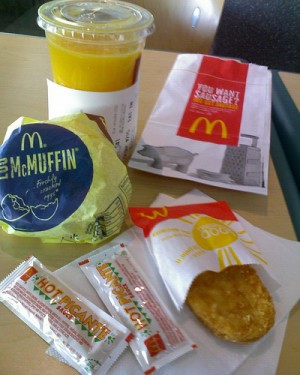A Debate about Food Deserts

DCentric
Fast food: unhealthy, but delicious when you're too exhausted to travel for nutrition.
Postbourgie’s Nicole takes on “The Myth of the Food Desert“, by The Root’s John McWhorter. McWhorter wrote:
The no-supermarket paradigm discourages us from considering that human beings acquire — through childhood experience, cultural preferences and economics — a palate…
Culture, too, creates a palate — and to point that out is not to find “fault.” Example: Slavery and sharecropping didn’t make healthy eating easy for black people back in the day. Salt and grease were what they had, and Southern blacks brought their culinary tastes North (Zora Neale Hurston used to bless her friend Langston Hughes with fried-chicken dinners)…All of which is to say that our take on the obesity issue at hand cannot be that sugary and high-fat food is always the only food that is available to poor people within walking distance. It simply isn’t true.
Nicole responds:
I’ll lay it out for him. Obesity (along with hunger) is dramatically higher among poor communities. And guess what? If you are poor, your access to affordable, nutritious food is more likely to be limited…
There’s also a larger and more disconcerting problem with McWhorter’s argument…this country suffers from “a fundamental misunderstanding of what the word culture means and how culture arises“, particularly when it comes to nonwhites, and McWhorter should know better than to use it as justification for acquiring tastes. Furthermore, science tells us that it’s not just black people that like salty, fatty, sugary foods — we’re all biologically predisposed to go after those foods, a vestige of our days as hunter-gatherers with unstable food sources. Using culture to justify a like of fried food is not only lazy, it’s just not true. And again, McWhorter illustrates my earlier point. Know why “slavery and sharecropping didn’t make healthy eating easy for black people”? Because slaves and sharecroppers lived in poverty. And in case you missed it earlier, poverty makes it hard to eat a healthy diet.
I’m inclined to agree with Nicole. Calling food deserts a “myth” isn’t just surprising, it’s inaccurate. McWhorter uses one example of a lovely grocery store in West Harlem; there are still obese people of color in the neighborhood, so poof! Food deserts must not be the problem!
I’m amazed at this conclusion, and the effort to extrapolate it beyond one cherry-picked neighborhood. So what if there are obese people within blocks of a pretty grocery store in one part of New York? I’m sure there are people in D.C., Detroit and other cities who don’t feel like they have convenient access to fresh fruits and vegetables, despite this sterling example of a well-located store in Derek Jeter-land.
Occasionally, I’ll hear people discussing whether food deserts are a myth in our cocoa city; they’ll dismiss the lack of access in certain wards by pointing out that there are stores just outside of the district, in Maryland for example. That may be true, but if someone is working two jobs to make ends meet, and they lack a car, having to take two buses to carry home heavy bags of food from a grocery store in Maryland makes a pretty strong case for a lack of access to me. When faced with such an arduous journey to procure food, who wouldn’t give in and just grab a burger when they’re exhausted, their culture be damned?
-
http://avirilenagalingam.blogspot.com/ nandalal rasiah
-
SD






